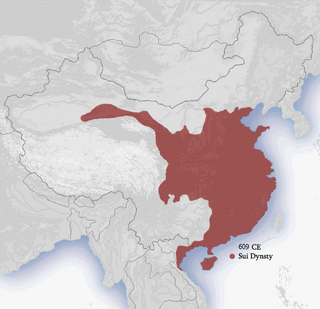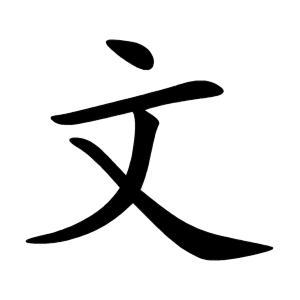You is the Mandarin Pinyin spelling of a Chinese given name.
People with this name include:

The Sui dynasty was a short-lived Chinese imperial dynasty that ruled from 581 to 618. The re-unification of China proper under the Sui brought the Northern and Southern dynasties era to a close, ending a prolonged period of political division since the War of the Eight Princes. The Sui endeavoured to rebuild the country, re-establishing and reforming many imperial institutions; in so doing, the Sui laid much of the foundation for the subsequent Tang dynasty, who after toppling the Sui would ultimately preside over a new golden age in Chinese history.

劉 / 刘 is an East Asian surname. pinyin: Liú in Mandarin Chinese, Lau4 in Cantonese. It is the family name of the Han dynasty emperors. The character 劉 originally meant 'battle axe', but is now used only as a surname. It is listed 252nd in the classic text Hundred Family Surnames. Today, it is the 4th most common surname in mainland China as well as one of the most common surnames in the world.

Zhao is a Chinese-language surname. The name is first in the Hundred Family Surnames – the traditional list of all Chinese surnames – because it was the emperor's surname of the Song dynasty (960–1279) when the list was compiled. The first line of the poem is 趙錢孫李.

The Zizhi Tongjian (1084) is a chronicle published during the Northern Song dynasty (960–1127) that provides a record of Chinese history from 403 BC to 959 AD, covering 16 dynasties and spanning almost 1400 years. The main text is arranged into 294 scrolls, each equivalent to a chapter—totaling around 3 million Chinese characters.
For most of its history, China was organized into various dynastic states under the rule of hereditary monarchs. Beginning with the establishment of dynastic rule by Yu the Great c. 2070 BC, and ending with the abdication of the Xuantong Emperor in AD 1912, Chinese historiography came to organize itself around the succession of monarchical dynasties. Besides those established by the dominant Han ethnic group or its spiritual Huaxia predecessors, dynasties throughout Chinese history were also founded by non-Han peoples.
Taizu is a temple name typically, but not always, used for Chinese monarchs who founded a particular dynasty, may refer to:
Sun is a transliteration of a common Chinese surname. It is the third name listed in the Song dynasty classic text Hundred Family Surnames.

Southern Tang was a dynastic state of China that existed during Five Dynasties and Ten Kingdoms period. Located in southern China, the Southern Tang proclaimed itself to be the successor of the Tang dynasty. The capital was located at Nanjing in present-day Jiangsu Province. At its territorial peak in 951, the Southern Tang controlled the whole of modern Jiangxi, and portions of Anhui, Fujian, Hubei, Hunan, and Jiangsu provinces.
Liu Yan may refer to:
Xu Jingzong, courtesy name Yanzu, posthumously known as Duke Gong of Gaoyang, was a Chinese cartographer, historian, and politician who served as a chancellor in the Tang dynasty. Allied with Emperor Gaozong's powerful wife, Empress Wu, Xu Jingzong was exceedingly powerful and effective throughout most of Gaozong's reign. By order of Empress Wu, he played a major role in the elimination of the chancellors opposed to her, between years 657 to 659 and 665.

Lü is the pinyin and Wade–Giles romanisation of a Chinese surname, most commonly 吕 and 呂.
This is a family tree of Chinese monarchs from the Northern and Southern dynasties period to the collapse of the Southern Song dynasty.
Empress Wang may refer to:

Wen is the pinyin romanisation of the Chinese surname 文 (Wén).

Tián, or T'ien in Wade-Giles is a Chinese surname. An alternative transliteration of "田" from Cantonese is Tin, from Hokkien is Thinn. It appeared in the Hundred Family Surnames text from the early Song dynasty. It also means "field". In 2019 it was the 34th most common surname in mainland China.
Xu You may refer to:

Li or Lee is a common Chinese surname, it is the 4th name listed in the famous Hundred Family Surnames. Li is one of the most common surnames in Asia, shared by 92.76 million people in China, and more than 100 million in Asia. It is the second-most common surname in China as of 2018, the second-most common surname in Hong Kong, the most common surname in Macau and the 5th most common surname in Taiwan, where it is usually romanized as "Lee". The surname is pronounced as in Cantonese, Lí (poj) in Taiwanese Hokkien, but is often spelled as "Lee" in Hong Kong, Macau, Taiwan, Thailand and many overseas Chinese communities. In Macau, it is also spelled as "Lei". In Indonesia it is commonly spelled as "Lie". The common Korean surname, "Lee", and the Vietnamese surname, "Lý", are both derived from Lee and written with the same Chinese character (李). The character also means "plum" or "plum tree".

Xu is a Chinese-language surname. In the Wade-Giles system of romanization, it is spelled as "Hsu", which is commonly used in Taiwan or overseas Chinese communities. It is different from Xu, represented by a different character.

Xu is a Chinese surname. In the Wade-Giles system of romanization, it is romanized as Hsu, which is commonly used in Taiwan.
Jian is a given name of Chinese origin. Notable people with the name include: